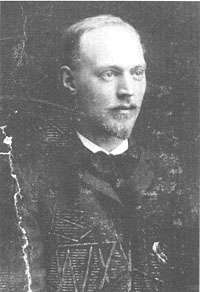Willy Kruyt
| Willy Kruyt | |
|---|---|
 | |
| Member of the House of Representatives[1] | |
|
In office 1918–1922 | |
| Personal details | |
| Born |
September 8, 1877 Amsterdam, Netherlands |
| Died |
Ca. July 1943[2] Berlin, Nazi Germany |
| Political party | League of Christian Socialists |
| Other political affiliations | Communist Party of Holland |
John William (Willy) Kruyt (1877–1943) was a Dutch Protestant minister and Christian socialist, later Communist, politician.
The son of a Dutch publisher and his Scottish wife, Kruyt studied theology at Utrecht and joined the League of Christian Socialists in 1910. In 1913, he was elected chairman of this party; in 1918, he became its only member of the House of Representatives. In the same period, he worked as a Reformed minister at Gennep.[2] When, in 1921, the League had disintegrated due to factional struggles between orthodox Protestants and anarchists, Kruyt joined the Communist Party.[1] He stood as a Communist candidate for the 1922 elections, but was not re-elected.
Following his wife's death, Kruyt emigrated to Berlin where he joined Workers International Relief, then to Moscow in 1935 (presumably fleeing from the Nazis)[3] to work at the Lenin State Library. Dissatisfied with Stalinism, he trained as a spy in the hopes of getting back to the Netherlands this way. From England, he parachuted into Belgium in June 1942. He broke his leg and was arrested by the German occupiers who detained him at Fort Breendonk. Kruyt was tortured and deported to the Moabit prison in Berlin where he is thought to have been executed by firing squad in 1943.[3]
References
- 1 2 "J.W. (Willy) Kruyt". Parlement & Politiek. Parlementair Documentatie Centrum, Leiden University. Retrieved 23 November 2015.
- 1 2 Noordegraaf, Herman (1998). "Kruyt, John William". Biografisch lexicon voor de geschiedenis van het Nederlands protestantisme. Kok/Huygens ING. pp. 269–270.
- 1 2 Noordegraaf, Herman (2015) [1990]. "John William Kruyt". Biografisch Woordenboek van het Socialisme en de Arbeidersbeweging in Nederland. International Institute for Social History.